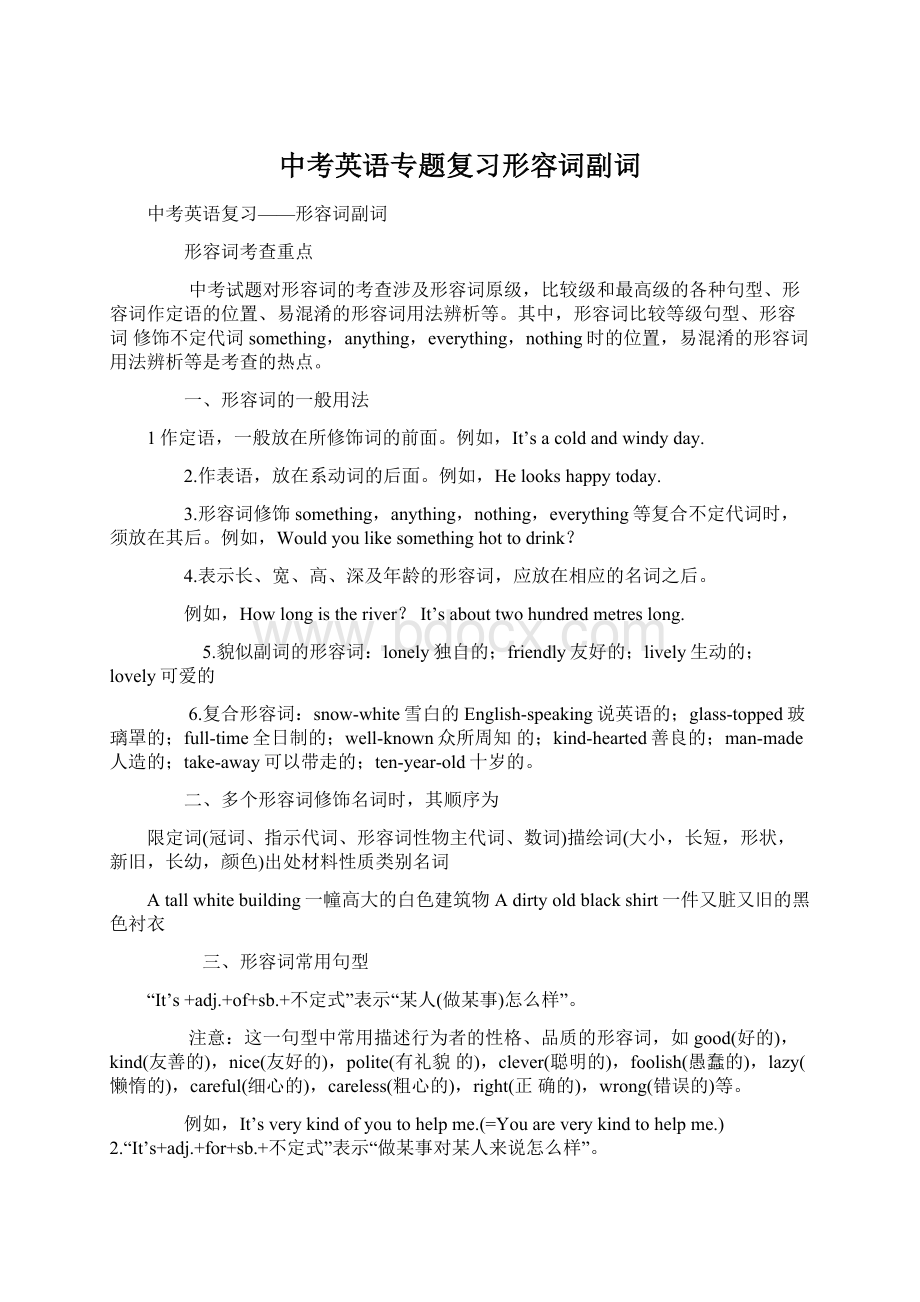中考英语专题复习形容词副词文档格式.docx
《中考英语专题复习形容词副词文档格式.docx》由会员分享,可在线阅读,更多相关《中考英语专题复习形容词副词文档格式.docx(69页珍藏版)》请在冰豆网上搜索。

well-known众所周知的;
kind-hearted善良的;
man-made人造的;
take-away可以带走的;
ten-year-old十岁的。
二、多个形容词修饰名词时,其顺序为
限定词(冠词、指示代词、形容词性物主代词、数词)描绘词(大小,长短,形状,新旧,长幼,颜色)出处材料性质类别名词
Atallwhitebuilding一幢高大的白色建筑物Adirtyoldblackshirt一件又脏又旧的黑色衬衣
三、形容词常用句型
“It’s+adj.+of+sb.+不定式”表示“某人(做某事)怎么样”。
注意:
这一句型中常用描述行为者的性格、品质的形容词,如good(好的),kind(友善的),nice(友好的),polite(有礼貌的),clever(聪明的),foolish(愚蠢的),lazy(懒惰的),careful(细心的),careless(粗心的),right(正确的),wrong(错误的)等。
例如,It’sverykindofyoutohelpme.(=Youareverykindtohelpme.) 2.“It’s+adj.+for+sb.+不定式”表示“做某事对某人来说怎么样”。
这一句型中常用的形容词有important(重要的),necessary(必要的),difficult(困难的),easy(容易的),hard(艰难的),dangerous(危险的),safe(安全的),useful(有益的),pleasant(舒适的),interesting(有趣的),impossible(不可能的)等。
例如,It’snoteasyforthemtolearnaforeignlanguage.(=Tolearnaforeignlanguageisnoteasyforthem.)
3.表示感情或情绪的形容词,如glad(高兴的),pleased(高兴的),sad(忧伤的),thankful(感激的);
表示能力和意志的形容词如ready(乐意的,有准备的),able(有能力的),sure(一定),certain(一定)等常接不定式。
I’mverysadtohearthebadnews.Heissuretogettoschoolontime.
副词考查重点
中考试题对副词的考查涉及常用副词的用法、副词等级的各种句型、易混淆的副词用法辨析等。
其中,频度副词always,often,usually,sometimes,never,时间副词already,yet,still,just,疑问副词how,why,when,where,程度副词enough,quite以及too,also,either等的用法区别,副词比较等级句型是考查的热点。
一、副词的分类
副词按词汇意义可分为:
方式副词:
well,fast,slowly,carefully,quickly
程度副词:
very,much,enough,almost,rather,quite
地点副词:
here,there,out,somewhere,abroad,home,
时间副词:
today,early,soon,now,then,recently,still
频度副词:
always,often,usually,sometimes,seldom,never
否定副词:
no,not,neither,nor,
疑问副词:
where,how,why其他:
also,too,only
二、副词的基本用法
副词是用来修饰动词、形容词、其他副词以及全句话的词类,表示时间、地点、程度、方式等概念。
例如,1.Weshouldlistentoourteacherscarefully.
三、中考常见副词用法辨析
1、already与yet的区别
already用于肯定句句中,表示“已经”;
yet用于否定句句末,表示“还”,用于疑问句句末,表示“已经”
例如,HehadalreadyleftwhenIcalled.aveyoufoundyourruleryet?
注意:
already还可以表示惊奇,惊讶等语气,常用于疑问句句末
例如:
Hasyoursongonetoschoolalready?
2very,much和verymuch.的区别
very用于修饰形容词或副词的原级;
much用于修饰形容词或副词的比较级;
修饰动词要用verymuch.
例如,Johnisveryhonest.
3.so与such的区别
⑴so修饰形容词或副词;
such修饰名词,
例如,MybrotherrunssofastthatIcan’tfollowhim. Heissuchaboy. ⑵so修饰的形容词后可以有一个单数的可数名词,其结构是“so+形容词+a/an+可数名词单数”.
such可以修饰可数名词单复数和不可数名词,名词前可以有形容词作定语,其结构是“such+a/an+形容词+可数名词单数”,“such+形容词+可数名词复数/不可数名词”,
.例如,Heissocleveraboy.=Heissuchacleverboy.
⑶如果可数名词复数前有many,few或不可数名词前有much,little修饰,用so不用such.
例如,somany(如此多的);
sofew(如此少的)可以加可数名词复数
somuch(如此多的);
solittle(如此少的)可以加不可数名词
4.also,too,aswell与either的区别
also,aswell,too,用于肯定句,also常用于be动词,情态动词,助动词之后,行为动词之前;
aswell,too用于句末;
either用于否定句中,置于句末。
例如,Myfatherisateacher.Mymotherisalsoateacher.
=Myfatherisateacher.Mymotherisateacheraswell.
=Myfatherisateacher.Mymotherisateacher,too.
Ican’tspeakFrench..Jennycan’tspeakFrench,either
5.sometime,sometimes,sometime与sometimes的区别
sometime:
某一时间,某一时刻,可指将来时,也可指过去时
sometimes:
有时,不时的sometime:
一段时间sometimes:
几次,几倍
.例如,We’llhaveatestsometimenextmonth. Sometimeswearebusyandsometimeswearenot.
HestayedinBeijingforsometimelastyear.havebeentoBeijingsometimes.
6.ago与before的区别
ago表示以现在为起点的“以前”,常与一般过去时连用,不可以单独使用。
before指过去或将来的某时刻“以前”,也可泛指以前,常和完成时连用,可以单独使用。
例如,Isawhimtenminutesago. Hetoldmethathehadseenthefilmbefore.
7.now,just与justnow的区别
now:
与一般现在时、现在进行时、现在完成时连用,意为“现在”
just:
与现在完成时、过去完成时连用,表示“刚……”
justnow:
和过去时连用,表示“刚才”
例如,Wheredoeshelivenow?
他现在住哪里?
Wehavejustseenthefilm.我们刚看过这场电影。
Hewasherejustnow.他刚才在这里。
窗体顶端
窗体底端
形容词,副词的比较级、最高级
一、规则变化
一般在词尾直接加er或est,例如,tall-taller-tallest,long-longer-longest
2.以不发音的字母e结尾的单词在词尾直接加r或st,例如,nice-nicer-nicest
3.以辅音字母+y结尾的词,把y变为i,再加er或est,例如,heavy-heavier-heaviest
4.重读闭音节,末尾只有一个辅音字母,双写这个辅音字母,再加er或est,例如,big-bigger-biggest
5.部分双音节词和多音节词分别在原级前加more构成比较级和most构成最高级,例如,slowly-moreslowly-mostslowly;
beautiful-morebeautiful-mostbeautiful
二、不规则变化
形容词,副词等级的用法
一、原级的用法
只能修饰原级的词,very,quite,so,too
例如,Heistootiredtowalkon.他太累了以至于不能再继续走了。
2.原级常用的句型结构
(1)“甲+be+(倍数)+as+形容词原级+as+乙”表示“甲和乙程度相同”或“甲是乙的几倍”
TomistwiceasoldasKate.
“甲+实意动词+(倍数)+as+副词原级+as+乙”表示“甲和乙程度相同”或“甲是乙的几倍”
例如,TomrunstwiceasfastasMike.
(2)“甲+be+not+as/so+形容词原级+as+乙”甲不如乙…
例如,Thisroomisnotas/sobigasthatone.
“甲+助动词+not+动词原形+as/so+副词原级+as+乙”甲不如乙…
例如,Hedoesn’twalkasslowlyasyou.
二、比较级的用法
1.可以修饰比较级的词,much,alot,far,…的多alittle,abit,…一点儿even甚至,still仍然
例如,LessonOneismucheasierthanLessonTwo.
(1)“甲+be+(倍数)+形容词比较级+than+乙”表示“甲比乙…”或“甲比乙…几倍”
例如,Thisroomisthreetimesbiggerthanthatone.
“甲+实意动词+(倍数)+副词比较级+than+乙”表示“甲比乙…”或“甲比乙…几倍”
例如,Igotupearlierthanmymotherthismorning.
(2)“甲+be+形容词比较级+than+anyother+单数名词(+介词短语)”表示“甲比同一范围的任何一个人/物都……”,含义是“甲最……”。
例如,TheYangtzeRiverislongerthananyotherriverinChina.
=TheYangtzeRiverislongerthantheotherriversinChina.长江比中国的其他所有的河都长。
TheYangtzeRiverislongerthananyriverinJapan.长江比日本的任何一条河都长。
“甲+实意动词+副词比较级+than+anyother+单数名词(+介词短语)”表示“甲比同一范围的任何一个人/物都……”,含义是“甲最……”。
例如,Mikegetstoschoolearlierthananyotherstudentinhisclass.
MikegetstoschoolearlierthananystudentinTom’sclass.迈克比汤姆班上任何一个学生到校都早。
(迈克和汤姆不是同一个班)
(3)“甲+be+the+形容词比较级+ofthetwo+……”表示“甲是两者中较……的”。
例如,Lookatthetwoboys.Mybrotheristhetallerofthetwo.
(4)“比较级+and+比较级”表示“越来越……”。
例如,Heisgettingtallerandtaller.
(5)“the+比较级,the+比较级”表示“越……,越……”。
例如,Themorecarefulyouare,thefewermistakesyou’llmake.
(6)“特殊疑问词+be+形容词比较级,甲or乙?
”
例如,Whichisbigger,theearthorthemoon?
“特殊疑问词+实意动词+副词比较级,甲or乙?
例如,Whodrawsbetter,JennyorDanny?
3.最高级常用句型结构
(1)“主语+be+the+形容词最高级+单数名词+in/of短语”表示“……是……中最……的”。
例如,Thisappleisthebiggestofthefive.
“主语+实意动词+(the)+副词最高级+单数名词+in/of短语”表示“……是……中最……的”。
例如,Ijump(the)farthestinmyclass.我是我们班跳得最远的。
(2)“主语+be+oneofthe+形容词最高级+复数名词+in/of短语”表示“……是……中最……之一”。
例如,BeijingisoneofthelargestcitiesinChina.
(3)“特殊疑问词+be+the+最高级+甲,乙,or丙?
”用于三者以上的比较。
例如,Whichcountryisthelargest,China,BrazilorCanada?
“特殊疑问词+be+the+副词最高级+甲,乙,or丙?
”用于三者以上的比较
例如,Whichseasondoyoulike(the)best,spring,summerorautumn?
例题剖析
1Ihave_____todotoday.
A.anythingimportantB.somethingimportant
C.importantnothingD.importantsomething
答案B形容词修饰复合不定代词时应放在其后面。
故排除C、D,句意是“我今天有重要的事情要做”,表示肯定用something。
2—Ischemistrymoredifficultthanphysics?
—No,chemistryisn’tas____asphysics.
A.easyBdifficultC.easierD.moredifficult
答案B(not)as…as中应接形容词原级,结合上句“化学没有物理难”,故B是正确的。
3.Beijingisbecoming_________and__.
A.morebeautiful,moreB.beautiful,beautiful
C.more,morebeautifulD.morebeautiful,morebeautiful
答案C比较级+and+比较级,表示“越来越…”,多音节的形容词“moreandmore+形容词”。
4.______childrenthereareinafamily,_____theirlifewillbe.
A.Theless,thebetterB.Thefewer,thebetter
C.Fewer,richerD.More,poorer
答案Bthe+比较级,the+比较级,表示“越……越……”,由句意得知“家里孩子越少,生活会越好”。
children是可数名词,应用few来修饰。
5.Theexperimentwas________easierthanwehadexpected.
A.moreB.muchmoreC.muchD.moremuch
答案Cmuch可修饰比较级,easier本身已是比较级,不能再用more.
6Oct15thwasoneof________daysin2003.TheShenzhou-Vwassentupsuccessfully.
A.excitingB.moreexcitingC.themostexcitingD.muchexciting
答案C根据“oneof+最高级+复数名词”固定句型应选C。
7.It’sseveno’clockintheafternoon,buttheyare______havingameeting.
AalreadyB.stillC.yetD.ever
答案Bstill意为“仍旧,仍然”,这句话的意思是:
现在已经是下午七点,他们仍旧在开会。
8.Remembernottospeak_______whenweareinthereadingroom.
A.fastB.slowlyC.politelyD.loudly
答案D“在阅览室里不要大声说话”,副词loudly修饰动词speak.
9.“______hasthisfoodstorebeeninbusiness?
“Since2001.”
A.HowlongB.HowoftenC.HowoldD.Howsoon
答案A“since+过去时间点”为“从过去的某一时间到现在”,表示一段时间,故选“howlong”.
10.—Whatwastheweatherlikeyesterday?
—Itwasterrible.Itrainedso___thatpeoplecould_________goout.
A.hardly…hardB.hardly…hardlyC.hard…hardl D.hard…hard
答案Crain在句中是动词,作谓语,后面用副词修饰,hard作副词,是“猛烈地”的意思,hardly是“几乎不”的意思。
-同步练习
1.ata____cough!
Youseem_____ill.
A.terrible,terriblyB.terribly,terrible
C.terrible,terribleD.terribly,terribly
2.Ifeeleven_____now.
A.badB.wellC.worseD.worst
3.Shewasveryhappy.Sheran_____ofalltherunners.
A.fastestB.thequickestC.slowestD.quickly
4.Keepquiet,please.It’s_____noisyhere.
A.manytooB.toomanyC.muchtooD.toomuch
5.—Haveyou_____spokentoaforeigner?
—No,_____.
A.already,neverB.ever,neverC.yet,alreadyD.ever,ever
6.Heistallerthan_________inhisclass.
A.anyboyB.anyC.anyotherboyD.someotherboys
7.I’llgoandvisityou____nextweek.
A.sometimeB.sometimesC.sometimesD.sometime
8.Thecarisrunning________.Itseemstobeflying.
A.moreandfasterB.moreandfastC.fastandfastD.fasterandfaster
9.Englishisas_____asChinese.Youshouldlearnitwell.
A.importantB.moreimportantC.themostimportantD.muchmoreimportant
10.Musicisnotsousefulasscience.It’s________usefulthanscience.
A.fewerB.lessCmoreD.alot
11.We’veneverheardof_____storybefore.
A.suchastrangeB.suchstrangeC.soastrangeD.sostrange
12.Youmustwearglasses.Theycankeepyoureyes______.
A.softB.safeC.safelyD.safety
13.Passmyglasses